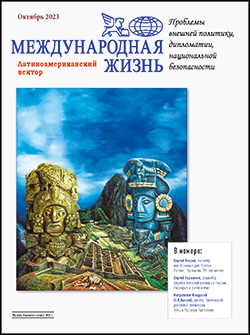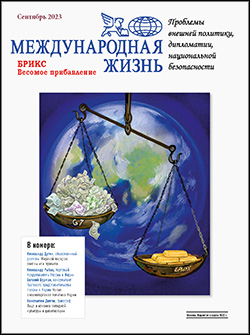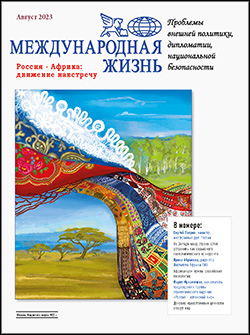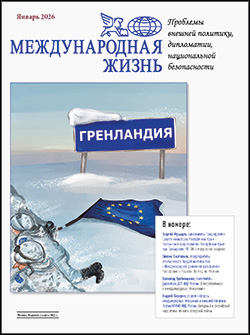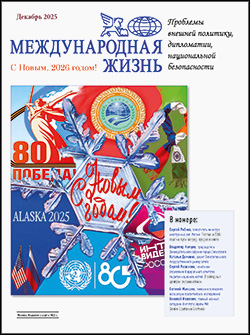Natalia Artemenkova, Vladimir Orlov
A WMD-free zone in the Middle East: how Moscow sees the way to its creation
2019 was marked by a significant event in the field of strengthening the WMD nonproliferation regime - the November UN Conference on the creation of a Middle East WMD. The Conference as a whole was more successful than could have been expected before it began. Thus, a new, serious, long-term process of moving towards a Middle East free of nuclear weapons and other WMD has started. To what extent will the positive effect of the November conference reduce the degree of discussion of the ZSOM in the upcoming OK 2020? And what will this dynamic mean for Russia and its interests?
Keywords: Middle East, WMD, WMD, NPT, IAEA, OPCW.
Victor Vasiliev
Germany - USA: friendship of convenience?
The US president is "obsessed with Germany", has an antipathy to her, as well as to A. Merkel herself. In this regard, he stubbornly denies his Germanic roots on his father's side, speaking of Swedish ancestry. Any critical remarks from Trump and his inner circle to Germany are often interpreted by the German media as a rejection of German-American friendship.
Keywords: Germany, USA, EU, NATO, European integration, transatlantic partnership
Roman Zimin
Chile in the Trans-Pacific Partnership (2010-2018)
12 states, about 40% of world GDP, a third of world trade, more than five years of negotiations, 30 thematic blocks and 6 thousand pages of text - all this is an agreement on the creation of the Strategic economic Trans-Pacific Partnership, one of the most ambitious economic projects of the 2010s. As one of the initiators of the partnership, the Republic of Chile actively participated in its work.
Keywords: Trans-Pacific Partnership, Chile, Asia-Pacific Region, free trade.
Congratulations on the 70th anniversary of Russian Foreign Minister Sergey Lavrov
Keywords: Sergey Lavrov's Anniversary
On the 300th anniversary of the archives of the Russian Foreign Ministry
In 2020, the archives of the Russian Foreign Ministry celebrate their 300th anniversary. The date of their birth is considered to be February 28 (March 10), 1720, when Peter I issued the "General Regulations of State Colleges". A separate chapter of this document was devoted to archives and ordered to concentrate all documents of the central authorities of the country, with the exception of financial ones, in the archive of the Board of Foreign Affairs (CID). Thus, the history of not only the departmental, but also the national archival service began counting down from the KID archive.
Keywords: 300th anniversary of the archives of the Russian Foreign Ministry
Alexander Akimov
New technologies in the economy are changing the world
The essence of the fourth industrial revolution was most clearly expressed by the founder and president of the World Economic Forum, Klaus Schwab, naming the Internet, robotics, artificial intelligence and learning devices as its main features. Its main difference was the reduction in the need for jobs in almost all industries. Thus, in the course of it, there is not so much an expansion of the possibilities of humanity, as a replacement of the ways of obtaining those benefits that people learned to produce earlier.
Keywords: productive forces, new technologies, international relations, developed countries, developing countries.
Anna Vilovatykh
Prospects for the hybridization of military conflicts in the context of the technological revolution
In the context of the technological revolution gaining momentum, the United States considers the "blurring" of the boundaries of military conflicts, that is, the use of a hybrid approach to the conduct of confrontation, to be an effective tool for maintaining global dominance. The combined resources of the United States and NATO allow Washington to increase information and psychological pressure on undesirable political regimes and at the same time "recommend" standards of behavior in the information and communication sphere to countries loyal to it.
Keywords: military conflict, technological revolution, information and communication technologies, cyberspace, cybersecurity, information and psychological impact, USA, Russia.
Ekaterina Mikhailova
Slactivism: modern ICT as a resource for the formation and articulation of public opinion
Human interaction with the political sphere of society takes place through information and communication channels. The political agenda, the balance of power in the state and international arena - the "reconciliation of hours" on these and other issues - is carried out precisely in the public communication space. This space is constantly being transformed, developing ICTs are opening up new ways of communicating political actors with society, articulating the positions of opinion leaders and pressure groups, as well as establishing effective feedback.
Keywords: activism, political agenda, social networks, new media, political communication, information support.
Vladimir Kruzhkov
Vlasovtsy: Russian collaborators against Stalin, Churchill, Roosevelt and the Jews
Radio Free Europe/Radio Liberty, funded by funds provided by the US Congress, has been making methodical attempts to rehabilitate the Vlasov movement in recent months. Meanwhile, many American congressmen and taxpayers would probably be surprised if they found out that Vlasov's military formations were actively fighting not only with Soviet troops and partisans ("with Stalin" - as some publicists prefer to interpret it), but also against American and British paratroopers, that is, "with Roosevelt and Churchill." In addition, the Vlasovites repressed civilians who disagreed with the policy of the Nazis, activists of the Resistance movement and incited anti-Semitism.
Keywords: Vlasov, ROA, Nazism, fascism, propaganda, denazification, neo-Nazism, radical nationalism, collaboration, anti-Semitism, Victory.
Galina Sidorova
Traditional institutions of Ethiopia in modern society
The Russia-Africa Summit, held in Sochi in October 2019, clearly showed Russia's increased interest in African states, as well as Africa's interest in Russia. During the round tables, meetings and conversations, it turned out that we don't know each other well yet. There are not enough cultural exchanges, and the information vacuum is being filled with the distorted truth about Russia by Western agencies. So that the distant African continent does not scare away like terra incognita, it is important to know the peculiarities of the mental culture of its peoples, the historical past and the richness of traditions. In this regard, the appearance of the work of Doctor of Historical Sciences R.N.Ismagilova "Ethiopia: Features of Federalism", published at the Institute of Africa of the Russian Academy of Sciences, is very relevant.
Keywords: Ethiopia, African studies, ethnicity, federalism.
Vladimir Petrovsky
Russia - India - China in the system of modern international relations
The Institute of the Far East of the Russian Academy of Sciences has published a book dedicated to the creation and formation of the Russia-India-China (RIK) dialogue structure. Sergey Uyanaev's work "Russia - India - China in the Contours of a New World Order" is the first monograph in Russian Oriental studies, which analyzes the main stages of the development of the strategic "triangle" Russia - India - China.
Keywords: RIK, monograph, S.V.Uyanaev, dialog format, world order, polycentricity.
Читайте другие материалы журнала «Международная жизнь» на нашем канале Яндекс.Дзен.
Подписывайтесь на наш Telegram – канал: https://t.me/interaffairs

 10:52 27.03.2020 •
10:52 27.03.2020 • 